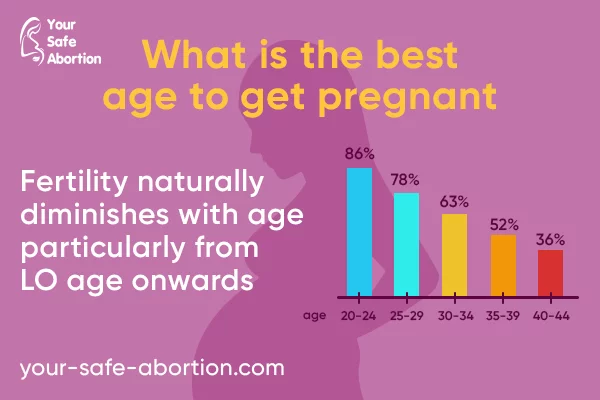
September 13, 2022 9:00
April 11, 2023 11:38
When is the Best Time to Conceive?
When is the Best Time to Get Pregnant?
Because pregnancy is more than a physical process, there is no precise “ideal” age for becoming pregnant. To raise a child and create a family, you must be physically, emotionally, and psychologically prepared. In the United States, the average age of first pregnancy is 25. While family planning is vital, an unintended pregnancy might happen without you realizing it. Your-safe-abortion.com is an online internet pharmacy that informs women about their alternatives if they find themselves in an undesirable pregnancy circumstance.
20-24 years old
This is the time of your life when you’re most fertile. Your menstruation will probably be regular and ovulatory. Unprotected sexual intercourse increases the odds of becoming pregnant. However, this is an age when women are mentally unfit to raise a child and, as a result, choose to use pregnancy prevention methods while having sexual relations.
25-29 years old
If you keep your nutrition and health in check, you’ll also be most fertile at this time. Being in shape, even after birth, is aided by staying fit. Getting pregnant and beginning in this age range is thought to reduce the risk of breast cancer. This age range was formerly known as the family-to-be group regarding emotions. Today’s woman, on the other hand, aspires to be financially secure in her late twenties. Consequently, the age at which women begin their families has shifted somewhat. Instead of bemoaning your destiny or actions if you inadvertently conceive, you may start seeking a solution right away. Most pregnant women who don’t want it choose to purchase abortion pills and have the operation done at home.
Following Group 30:
When a woman reaches the age of 30, her fertility starts to wane. This is a lengthy process, so don’t expect it to happen immediately. If you’re attempting to conceive at this age, you should see your doctor determine your ovulation period. Normal pregnancies have a somewhat reduced likelihood. If you take care of your health, you should have no trouble becoming pregnant. Because the majority of women in this age group are married and virtually settled in their lives, they want to have a family.
35-39 years old
The rate of loss in fertility is rapid in this age group. Getting pregnant might be challenging for women. There are no exceptions in this scenario for women who are absolutely fit and healthy. As a result, medical professionals advise that if you want to get pregnant while in this age group, you should start trying as soon as possible.
Group of people above the age of 40:
When a woman reaches the age of 40, she enters the perimenopause stage. During this time, you are the least fertile. Even if you do get pregnant, the risks and complications associated with this age group might be significant. You should see a doctor if you are at a period when women are supposed to be fertile but still have difficulty conceiving. Getting pregnant should not take more than a year. Get assistance if you’ve been trying for more than a year and are still having trouble.
SUMMARY
The average age of first pregnancy in the US is said to be 25. There’s no specific “best” age for getting pregnant because pregnancy is more than a physical thing. Age Group: 20-24 is a period when you’re most fertile, and your menstruation is most likely to be regular and ovulatory.
This is an age where women are emotionally unprepared to raise a baby and hence prefer taking pregnancy prevention measures while having sexual intercourse. After Group 30, age group: A woman’s fertility begins to decline as she crosses the age of 30.
If you are trying to get pregnant at this age, you can consider speaking to your doctor to know your ovulation period. Age group 35-39 is when women in this age group are expected to be fertile and still face problems in conceiving. After 40, most women reach their perimenopause phase, and fertility declines.

 Français
Français